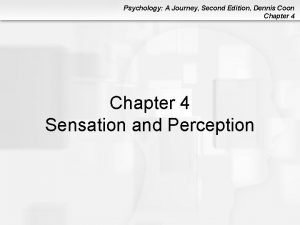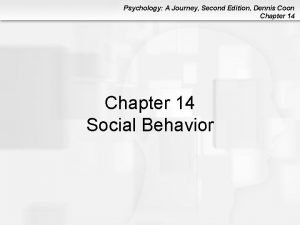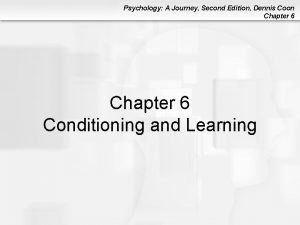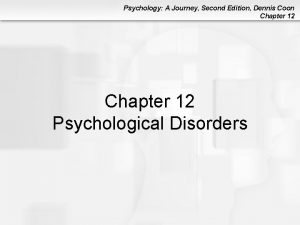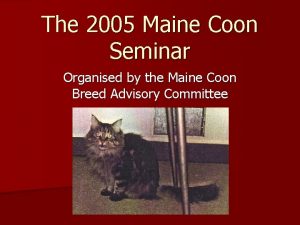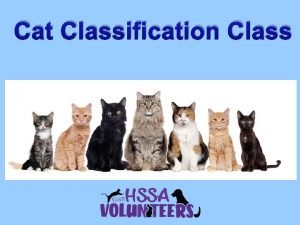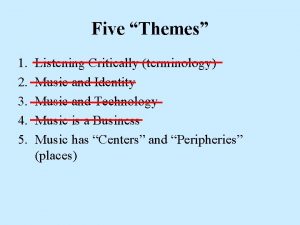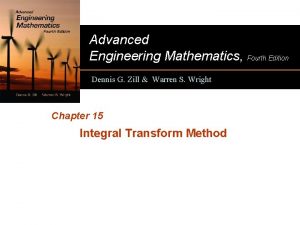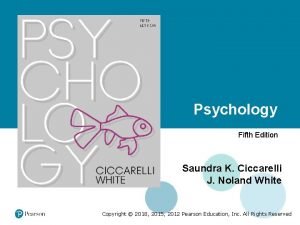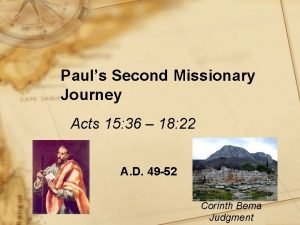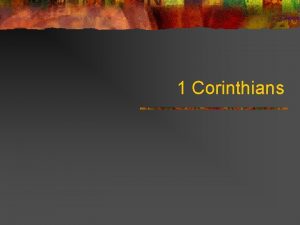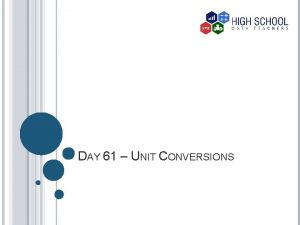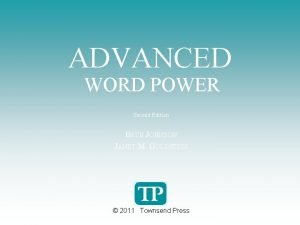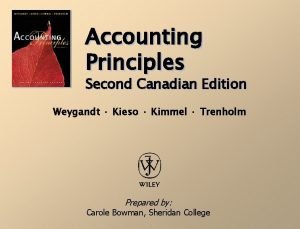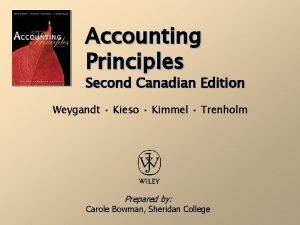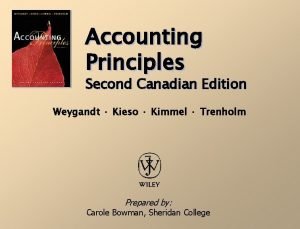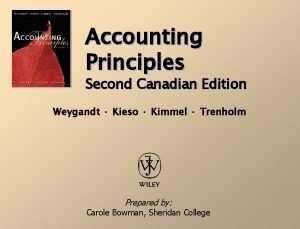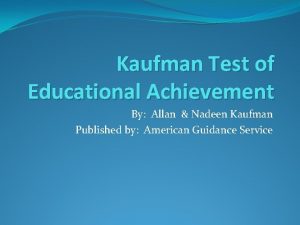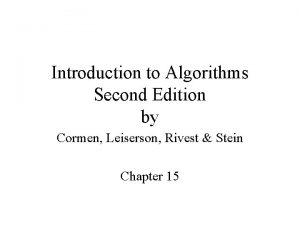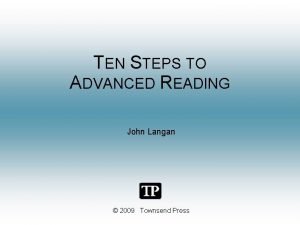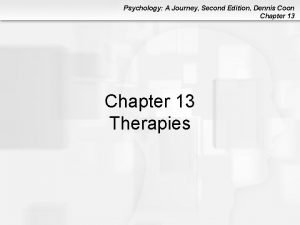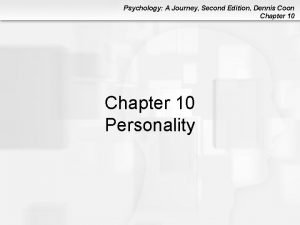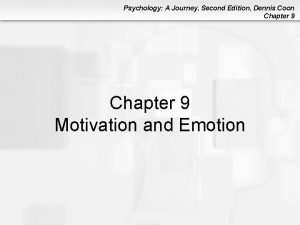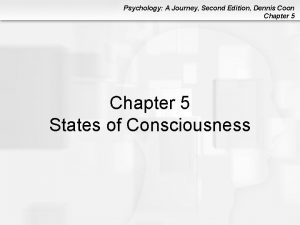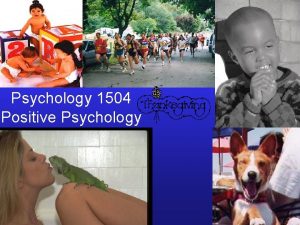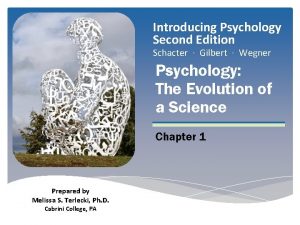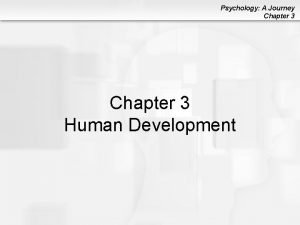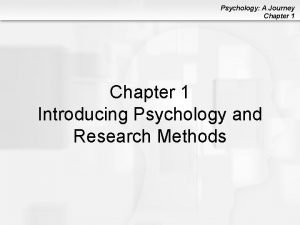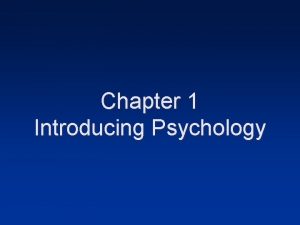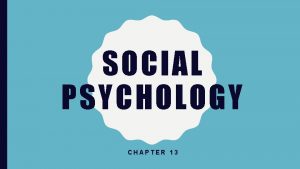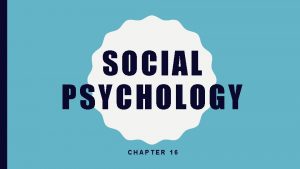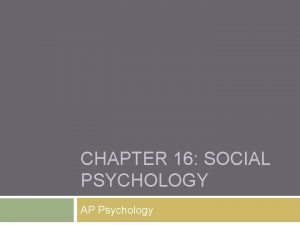Psychology A Journey Second Edition Dennis Coon Chapter























- Slides: 23

Psychology: A Journey, Second Edition, Dennis Coon Chapter 6 Conditioning and Learning

Psychology: A Journey, Second Edition, Dennis Coon Chapter 6 Learning: Some Key Terms • Learning: Relatively permanent change in behavior due to experience – Does NOT include temporary changes due to disease, injury, or maturation – Reinforcement: Any event that increases the probability that a response will recur • Response: Any identifiable behavior – Internal: Faster heartbeat – Observable: Eating, scratching

Psychology: A Journey, Second Edition, Dennis Coon Chapter 6 Major Types of Learning • Classical Conditioning: Event-Event learning – Pavlov and his dogs; Watson and Little Albert • Operant Conditioning: Behavior-Consequence learning – Thorndike; Skinner • Observational Learning: watch and imitate – Bandura and Bo. Bo doll experiment

Psychology: A Journey, Second Edition, Dennis Coon Chapter 6 Classical Conditioning and Ivan Pavlov • Russian physiologist who initially was studying digestion • Used dogs to study salivation when dogs were presented with meat powder • Also known as Pavlovian or Respondent Conditioning • Reflex: Automatic, nonlearned innate response e. g. , an eyeblink

Figure 6. 2 Psychology: A Journey, Second Edition, Dennis Coon Chapter 6 FIGURE 6. 2 An apparatus for Pavlovian conditioning. A tube carries saliva from the dog’s mouth to a lever that activates a recording device (far left). During conditioning, various stimuli can be paired with a dish of food placed in front of the dog. The device pictured here is more elaborate than the one Pavlov used in his early experiments.

Psychology: A Journey, Second Edition, Dennis Coon Chapter 6 Classical Conditioning Terminology Unconditioned Stimulus (US) • An event that consistently and automatically elicits an unconditioned response Unconditioned Response (UR) • An action that the unconditioned stimulus automatically elicits Conditioned Stimulus (CS) • Initially a neutral stimulus. After repeated pairings with the unconditioned stimulus, the CS elicits the same response as the US. Conditioned Response (CR) • The response elicited by the conditioned stimulus due to the training.

Figure 6. 3 Psychology: A Journey, Second Edition, Dennis Coon Chapter 6 FIGURE 6. 3 The classical conditioning procedure.

Psychology: A Journey, Second Edition, Dennis Coon Chapter 6 Principles of Classical Conditioning • Acquisition: Training period when a response is reinforced (the CS is followed closely by the US) • Expectancy: Expectation about how events are interconnected • Extinction: Weakening of a conditioned response through removal of reinforcement • Spontaneous Recovery: Reappearance of a learned response following apparent extinction

Figure 6. 4 Psychology: A Journey, Second Edition, Dennis Coon Chapter 6 FIGURE 6. 4 Acquisition and extinction of a conditioned response.

Psychology: A Journey, Second Edition, Dennis Coon Chapter 6 Extinction & Spontaneous Recovery

Psychology: A Journey, Second Edition, Dennis Coon Chapter 6 An example of a conditioned emotional response (fear)

Psychology: A Journey, Second Edition, Dennis Coon Chapter 6

Psychology: A Journey, Second Edition, Dennis Coon Chapter 6 Classical Conditioning in Humans • Phobia: Intense, unrealistic, irrational fear of a specific situation or object (e. g. , arachnophobia; fear of spiders; see the movie!) • Conditioned Emotional Response: Learned emotional reaction to a previously neutral stimulus • Desensitization: Exposing phobic people gradually to feared stimuli while they stay calm and relaxed

Psychology: A Journey, Second Edition, Dennis Coon Chapter 6 Operant Conditioning (Instrumental Learning) • Definition: Learning based on the consequences of responding; we associate responses with their consequences • Law of Effect (Thorndike): The probability of a response is altered by the effect it has; responses that lead to desired effects are repeated; those that lead to undesired effects are not • Operant Reinforcer: Any event that follows a response and increases its likelihood of recurring • Conditioning Chamber (Skinner Box): Apparatus designed to study operant conditioning in animals • Response-Contingent Reinforcement: Reinforcement given only when a particular response occurs

Figure 6. 9 Psychology: A Journey, Second Edition, Dennis Coon Chapter 6 FIGURE 6. 9 The Skinner box. This simple device, invented by B. F. Skinner, allows careful study of operant conditioning. When the rat presses the bar, a pellet of food or a drop of water is automatically released.

Psychology: A Journey, Second Edition, Dennis Coon Chapter 6 Timing of Reinforcement • Operant reinforcement most effective when given immediately after a correct response • Superstitious Behavior: Behavior that is repeated to produce reinforcement, even though it is not necessary • Shaping: Molding responses gradually to a desired pattern by reinforcing successive approximations to the target response • Successive Approximations: Ever-closer matches

Figure 6. 10 Psychology: A Journey, Second Edition, Dennis Coon Chapter 6 FIGURE 6. 10 Reinforcement and human behavior. The percentage of times that a severely disturbed child said “Please” when he wanted an object was increased dramatically by reinforcing him for making a polite request. Reinforcement produced similar improvements in saying “Thank you” and “You’re welcome, ” and the boy applied these terms in new situations as well.

Psychology: A Journey, Second Edition, Dennis Coon Chapter 6 Operant Extinction • Definition: When learned responses that are NOT reinforced gradually fade away

Psychology: A Journey, Second Edition, Dennis Coon Chapter 6 More Operant Conditioning Terms • Positive Reinforcement: When a response is followed by a reward or other positive event and the effect is to increase the likelihood of it recurring (e. g. , praising desired behavior) • Punishment: Any event that follows a response and decreases the likelihood of it recurring (e. g. , a spanking)

Psychology: A Journey, Second Edition, Dennis Coon Chapter 6 Types of Operant Reinforcers • Primary Reinforcer: Nonlearned and natural; satisfies biological needs (e. g. , food, water, sex) • Secondary Reinforcer: Learned reinforcer (e. g. , money, grades, approval) • Social Reinforcer: Learned desires for attention and approval • What did critics of Skinner say? – Free will vs. determinism

Psychology: A Journey, Second Edition, Dennis Coon Chapter 6 Modeling or Observational Learning (Albert Bandura) • Model: Someone who serves as an example in observational learning • Occurs by watching and imitating actions of another person or by noting consequences of a person’s actions – Occurs before direct practice is allowed

Psychology: A Journey, Second Edition, Dennis Coon Chapter 6 Steps to Successful Modeling • • Pay attention to model. Remember what was done. Be able to reproduce modeled behavior. If a model is successful or his/her behavior is rewarded, behavior more likely to be imitated. • Bandura created modeling theory with classic Bo-Bo Doll (inflatable clown) experiments • Skinner (shaping) vs. Bandura (modeling)

Psychology: A Journey, Second Edition, Dennis Coon Chapter 6 Self-Managed Behavioral Principles • • Choose a target behavior Record a baseline Establish goals Choose reinforcers Record your progress Reward successes Adjust your plan as you learn more about your behavior
 Psychology
Psychology Psychology a journey 4th edition chapter 1
Psychology a journey 4th edition chapter 1 Psychology a journey 4th edition chapter 1
Psychology a journey 4th edition chapter 1 Psychology a journey
Psychology a journey Maine coon nose bump
Maine coon nose bump Maine coon and dogs
Maine coon and dogs Jesse coon
Jesse coon Tom roush old zip coon
Tom roush old zip coon Advanced engineering mathematics dennis g zill 4th edition
Advanced engineering mathematics dennis g zill 4th edition Psychology fifth edition ciccarelli white
Psychology fifth edition ciccarelli white Acts 21 map
Acts 21 map Second missionary journey map
Second missionary journey map 186 282 miles per second into meters per second
186 282 miles per second into meters per second Advanced word power second edition answers
Advanced word power second edition answers Accounting principles second canadian edition
Accounting principles second canadian edition Accounting principles second canadian edition
Accounting principles second canadian edition Accounting principles second canadian edition
Accounting principles second canadian edition Clear thinking and writing
Clear thinking and writing Accounting principles second canadian edition
Accounting principles second canadian edition Kaufman test of educational achievement
Kaufman test of educational achievement Introduction to algorithms 2nd edition
Introduction to algorithms 2nd edition In company second edition
In company second edition Wechsler individual achievement test second edition
Wechsler individual achievement test second edition Ten steps to advanced reading 2nd edition answers
Ten steps to advanced reading 2nd edition answers
